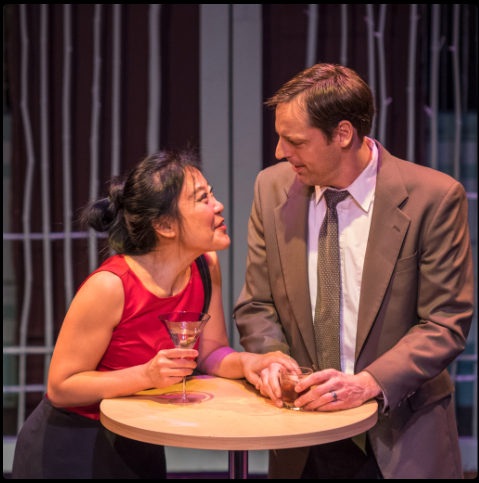ArtsWest’s Chinglish is funny and refreshing
Now in production at ArtsWest Theater in the West Seattle Junction is Chinglish through March 29.
Fri, 03/06/2015
By Amanda Knox
Annie Lareau was right; David Henry Hwang’s Chinglish is not an easy play to put on.
There’s the fact that the script suggests multiple and various settings that the small, ArtsWest stage must somehow accommodate. Scenic designer Carey Wong accomplishes this with minimalism: the barest necessities as far as furniture, slight variations to the arrangement of bamboo screens, and a small decorative hanging to provide character and reference to familiar locations. The only hitch in this otherwise successful display is the armoire that lies down to become a bed. It might not have been so noticeably heavy and distractingly clunky had the script not necessitated that it be dropped down and picked up again multiple times throughout the show.
But the scenic design is a familiar obstacle. Chinglish also presents a unique problem where the audience will most likely not understand the dominant language being spoken. The script requires the use of sub- or super-titles. It milks the advantages of this requirement for sure—innuendo run rampant—but all the jokes require the comedic timing not only onstage, but also above-stage onscreen. The timing of the supertitles in this production could have been tighter.
Then there are the casting difficulties. Where does one find a middle-aged, British-accented, fluent-Chinese-speaking actor in the greater Seattle area these days? Or even a full Chinese American cast of fluent-Chinese-speakers? Director Annie Lareau makes the point in her interview on the production] that, for lack of opportunity, actors of ethnic minority are driven away from theatre.
This is where the ArtsWest production shines. Lareau ultimately assembled a cast of character-driven actors who convince, compel, entertain, and yes, speak Chinese. Hing Lam as Cai was natural, dignified, and tragic in his believable loyalty and stoicism. Serin Ngai succeeded on putting on many hats throughout the show, bringing her characters to life with subtle, believable, and hilarious physical traits—from the slumping shoulders and insolent shuffleof the burnt-out waitress, to the bulging eyes and gawking, rounded mouth of the flustered and flabbergasted interpreter.
Kathy Hsieh as the lead female role, Xi Yan, steals the show. Hwang wrote her to be a complex and compelling character whose motivations and speech the audience is constantly trying to understand. Hsieh embodies all of her mysterious ferocity, wistfulness, passion, independence, and idealism.
Evan Whitfield plays her counterpart in the lead male role, Daniel Cavanaugh, a American businessman who, although clueless and pitiful as a puppy, is nevertheless is the key to the audience’s understanding of what is actually happening. Whitfield embodies him best when he’s pant-less and vulnerable, chasing Xi Yan around the bed with his tail between his legs and his heart on his sleeve.
Chinglish is about difference, and the chaos that arises from misunderstanding, even when both sides to a message are trying their best to give and receive what is truly meant. The perhaps unsurprising revelation is that Chinglish immediately lays bear is that language difference is secondary to cultural difference when it comes to understanding between Chinese and American people. Through Daniel, the audience is introduced to a world where yes means no, no means yes, and, “A curse upon your family for 18 generations!” means, “Meet me in your hotel room.” The perhaps surprising revelation is that Chinglish makes an even further revelation: that even recognizing cultural difference is an over-simplification of the chaos that arises when what is really meant and what is really at stake is misunderstood.
A small spoiler as to how the upside-down and backwards mess that arises all winds down comes with Daniel’s consulting presentation back in the United States, where he advises other businessmen to “know your place in their picture.” It is a lesson with deceptively straight-forward implications which Chinglish encourages the audience to pause and consider carefully, perhaps in all of our human interactions. After all, if you’re going to slip and fall, as we all inevitably do sometimes, you might as well “Slip And Fall Down Carefully.”
Chinglish is appearing at ArtsWest Theater in the West Seattle Junction through March 29.
Tickets are available at this link.


